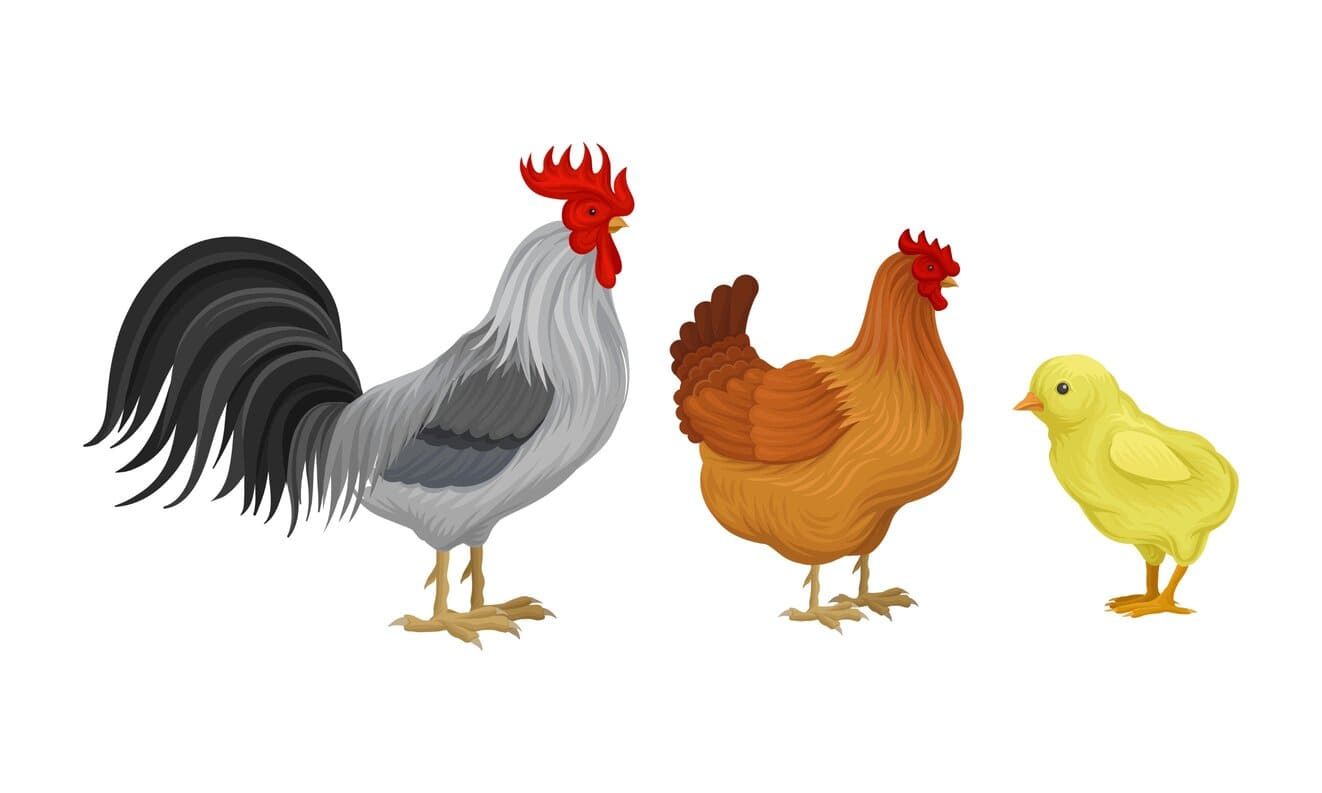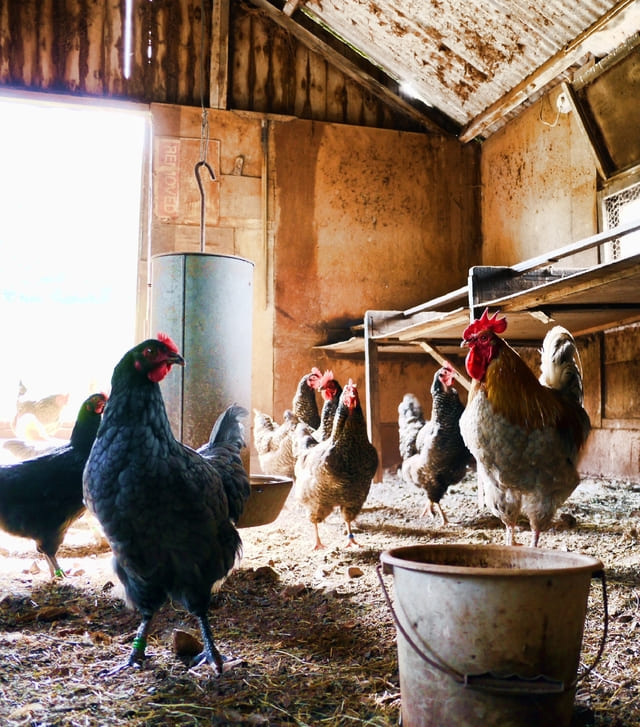For quite some time most people lost the connection they had with nature. 50 years ago most people knew the difference between a rooster and a hen. Times have changed, and today we need to read about these topics to know how to make a distinction between these two terms.
They are both chickens, but the rooster is a male chicken, while the hen is a female chicken. Also, roosters have a larger comb and wattles when compared to hens.
That may seem enough for you to know how to make a difference between them, but trust me, it is not that simple. Knowing the male and female chickens at their young age can be very hard to determine, even for an experienced farmer. Also, there are things to look out for, so keep reading.
Knowing Your Chicken
If you are not a farmer how can you know the difference between a hen and a rooster? Most of us eat chickens when their meat is processed but we don`t know how to define a chicken.
| Rooster | Hen | |
| Crest and wattle | Large and bright in color | Small, doesn`t draw attention |
| Feathers | Flashier, longer, pointy at the neck and tail | Subtle colors and patterns, not to draw attention |
| Peak | Strong and long, can be used in fighting | Small, used for eating and self-defense |
Defining a Rooster
Like all other animals, chickens have male and female counterparts. A rooster is a male chicken. It is larger and has a bigger crest and wattles. Both crest and wattles are in a brighter color than in hens. It may sound hard to notice, but once you see it you won`t miss it.
Another feature to look out for is neck feathers, called hackle feathers. In roosters, it is pointier and longer than on the hen. Depending on the breed of the chicken there are different types of hackle feathers, but in roosters, they will always be easy to notice.
Those feathers are also in several different colors so the rooster would look showier. Rooster also has saddle feathers that are growing on their back, towards the tail. And finally, the tail feathers on the rooster are flashier, longer, and easier to spot than at the hens.
Rooster as a male has some focused physical attributes, such as sheer size, masculinity, thicker legs, and broader shoulders. When compared to hens they are plain bigger and stronger.
With the difference in sex and size, there is also a difference in behavior. A rooster is a flock leader and his hens are most important to him. He is always on the lookout for any danger, and if anything threatens his flock he can fight it to the death. Besides keeping his hens safe, a rooster is also looking for food. When he finds food he points it out to hens. A rooster eats after the hens are fed.
Defining a Hen
Just as roosters, hens also have a crest and wattles, but are significantly smaller. Hens neck feathers are more rounded and shorter when compared to a rooster. The general color of the feathers is more subtle.
Roosters want to draw attention, and hence the color of the feathers, while hens aim towards blending with the environment. A hen spends a lot of time sitting on the eggs, and she doesn`t want to be seen by the predators.
Hens are smaller than roosters and they have a good reason for it. With their lightweight hens have a better chance of avoiding or escaping from a predator.
Hen’s behavior is significantly different from the rooster. Roosters are always loud and drawing attention, while hens are quiet and always in the group. Hens can often be heard talking between each other. That way they stay in contact and they can follow the flock.
FAQ About Roosters and Hens
What are Pullets and Cockerels?
A chicken that is in the process of growing is called a pullet if it is a female, or a cockerel if it is a male. Chickens are in this part of development from week 4 to week 17. This period of development is very important because chicks grow and develop very fast.
Any farmer that cares about his chickens will pay special attention to them while they are Pullets and Cockerels.
How can you tell that the chick is a male or a female?
If you are not a professional farmer it will be very hard to determine the sex of the chick while they are young. Visually defining sex can be done in weeks 5 to 7. In that time combs and wattles in roosters start to develop, and those are a sure signal of having a rooster.
Hens develop longer flying feathers, and rooster richer tail feathers. If you are still not sure do you have a hen or a rooster, wait for it to crow. Roosters make a distinguishing sound, especially early in the morning.
How to tell a rooster from a hen at 12 weeks?
By this time it is hard to miss the difference. Roosters are already developing saddle feathers that are in a different color from the rest.
Also, the difference in size is visible in most cases. And the most secure way to make the difference is by the crow. Hens and roosters are starting to make noise between 10 and 12 weeks. That can be definitive proof of having a rooster or a hen.
What is the difference between a rooster and hen meat?
Rooster meat is tough and chewy when compared to a hen’s meat. It needs to be cooked differently. Most of us will rarely taste rooster meat because hen meat is cheaper and more economic to make.
Hens meat is soft and tender, and can be roasted, slow-cooked, or made on steam. Rooster should be prepared longer, on low heat. That way it will be softer and easier to eat. Regarding the taste, there are also differences, especially if the rooster is old. The older the chicken, the meat tends to have a stronger flavor.
Can you determine the sex of the chick by the shape of the egg?
No. Some myths rounded eggs hatch out hens, while pointed produce roosters. There is no scientific proof to back that up. If that was true, then large hatcheries that produce chickens for human consummation would always choose to incubate eggs that are rounded. That way they will always get hens that are used for human food. This way they get a lot of roosters that have no use like hens.
Conclusion
It may be a trivial question, but when you think about it, there is nothing trivial about it. There is a lot of difference between a rooster and a hen, and the consumers of chicken meat would notice it right away.
This knowledge here would rather help someone who wants to start his own farming business, than others that are concerned about meals and chickenburgers, because they would never see a real live chicken.
But this should be common knowledge, because you may never know when you would need it. We take nature for granted and let someone else think about our food. We should know at least this bit about this animal that we rarely see in person but frequently eat. Think about it.




